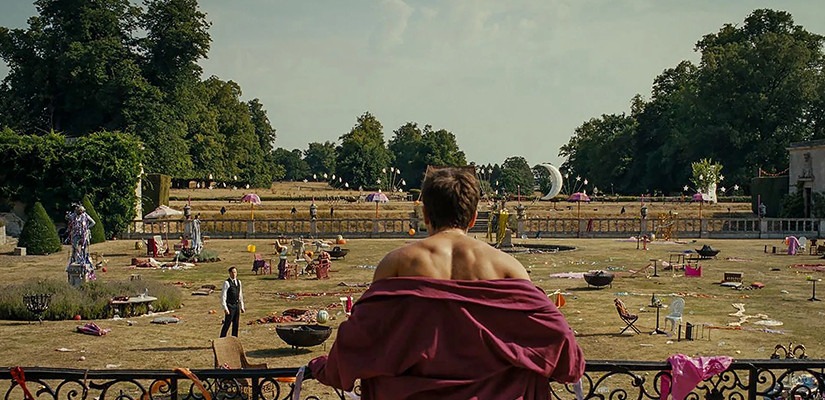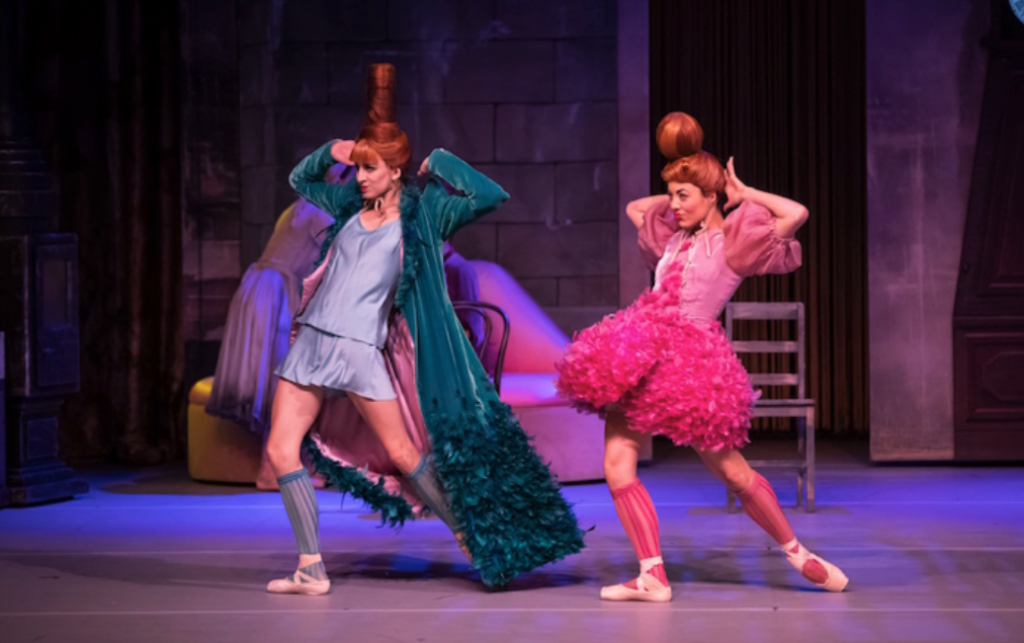
‘Saltburn’ // MRC and Amazon MGM Studios
‘Saltburn’ was duplicitous.
We all know the feeling of wanting something seemingly unattainable. The feeling seeps into the depths of our soul. It can be unrelenting. Some people learn to accept and move on. Others find such circumstances categorically unfair. And then there are those whose feelings are harder to discern – whose actions leave outsiders uncertain of their intentions. The latter forms the main character study of director Emerald Fennell’s sophomore feature, ‘Saltburn’.
Serving as the much anticipated follow up to Fennell’s academy award winning debut ‘Promising Young Woman’ (2020), ‘Saltburn’ premiered at the Telluride Film Festival in August 2023. It followed this in October by serving as the opening film of the BFI London Film Festival and Fennell herself was recognised with the Filmmaker of the Year award at the California Film Institute’s Mill Valley Film Festival. The following month, Fennell received the Spotlight Director Award at the Savannah Film Festival. Australian audiences were treated to a sneak preview of the film at SXSW Sydney and the Adelaide International Film Festival before it opening to limited release on 16 November.
While a quintessentially British production, ‘Saltburn’ features several ties to Australia, one such being Margot Robbie serving as a producer through her production company, LuckyChap Entertainment (in collaboration with MRC and Amazon MGM Studios). With Australian cinema renowned for its atmospheric psychological horror and thrills, Robbie’s association feels appropriate for the aesthetic and tone of ‘Saltburn’.
Duplicity runs deep throughout ‘Saltburn’. An intriguingly dark psychological thriller and black comedy hybrid, the film is a majestically shot, skillfully entrancing viewers while also leaving them with a feeling of eerie foreboding. As any good psychological thriller does, it asks its audiences whether we truly know a person. Or, more precisely, do we truly know ourselves?
‘Saltburn’ is a spiritual successor to Fennell’s critically acclaimed ‘Promising Young Woman’. Both films analyse pressing social issues with a darkly satiric, often uncomfortable lens. While ‘Promising Young Women’ examined gender politics and sexual misconduct, ‘Saltburn’ turns its attention to class struggle and wealth divide. It is the latest film in a recent wave of ‘eat the rich’ media (Ruben Östlund’s ‘Triangle of Sadness’, HBO’s ‘The White Lotus’, and the Bong Joon-Ho’s Oscar winning ‘Parasite’ come to mind), which serve to critique the division of societal wealth with a heavy dose of sarcasm. It could be argued that the recent wave of such media has led to some viewer fatigue. However, as Fennell demonstrates, sometimes the strength of a piece of media lies beyond the narrative.
The film stars Irish actor Barry Keoghan (‘The Killing of a Sacred Deer’; ‘The Banshees of Inisherin’) as Oliver Quick, a new scholarship student at Oxford University in the mid-2000s who feels isolated from his peers due to his financially limited upbringing. He watches his wealthier classmates revel in their luxurious lifestyles in quiet envy. Oliver’s circumstances change one day upon a chance encounter with the enigmatic and popular Felix Catton (portrayed by Brisbane-raised Jacob Elordi, best known for Netflix’s ‘The Kissing Booth’ franchise and HBO’s ‘Euphoria’). Striking up an unorthodox friendship, Felix invites Oliver back to his family’s estate, the eponymous Saltburn, over the summer break. However, it is over the summer period that odd occurrences take place, questions arise, secrets are exposed, and relationships are tested.
‘Saltburn’ is Fennell’s second foray into the role of writer-director. In crafting the script, Fennell aimed to challenge audiences to find sympathy for deplorable characters. This was not simply imbued within the dialogue, but the visuals also. Beautifully shot by cinematographer Linus Sandgren (who won an Academy Award for his work on ‘La La Land’), each frame of ‘Saltburn’ is hypnotising. Sandgren’s artistry is most notable throughout the second half of the film, in moments of quiet suspense. The use of mirrors, windows, and reflections throughout his framing serve as a visual motif of doubling. It cleverly highlights the fractured nature of human psychology – how we all have many layers which we try to hide but can only be submerged for so long.
Sandgren’s cinematography is nicely complemented by the setting of Saltburn. The fictional estate was filmed as at Drayton House in Northamptonshire. As the title would suggest, the estate is just as much a character of ‘Saltburn’ as Oliver or Felix. Ornate tapestries, gilded portraits, and pristine architecture fill the screen. Audiences are reminded numerous times that ‘you can get lost in Saltburn’, seemingly in more ways than one. Its opulence provides the film with another duplicitous feeling – wonderment and irritation. Viewers, much like Oliver himself throughout the film, are likely to question where the line is between grandeur and excess.
Speaking of excess, Fennell again proves herself to be a filmmaker unafraid to hold on uncomfortable moments. Her voyeuristic direction reads like a visual manifestation of the idiom “too awful to look away”. At least three sequences of ‘Saltburn’ are there to hold the audience captive in morbid curiosity. Some moments work more successfully than others, but all succeed in ensnaring audiences into a feeling of impending unease. While it is unlikely Fennell will secure a second Oscar nomination for directing, she nonetheless proves herself with ‘Saltburn’ to be a masterful artisan for building tension while sustaining a darkly comedic tone.
Much of the accolades ‘Saltburn’ has received since Telluride has been for its writing, visuals, and direction. However, its biggest accomplishment comes from its performances. Led spectacularly by Keoghan and Elordi, ‘Saltburn’ boasts a stellar ensemble. Esteemed character actor Richard E. Grant plays Felix’s passively exasperating father Sir James Catton with subtle comedic flare. Hot off the heels of his lead role in ‘Gran Turismo’, Archie Madekwe brings a layer of intrigue to the insufferably pious cousin Farleigh. Relative newcomer Alison Oliver is captivating as Felix’s multilayered sister Venetia. Teaming up with her ‘Promising Young Woman’ director for a second time, Carey Mulligan takes on a smaller, yet humorous role as Pamela, friend of the Catton family who may have worn out her welcome.
It is the lead men and Rosamund Pike who really steal the film though. Since her iconic role in David Fincher’s ‘Gone Girl’, Pike has excelled in bringing complicated, wholly unlikeable characters to the big screen. In ‘Saltburn’, Pike plays the Catton family matriarch Lady Elspeth. Elspeth passes harsh judgements upon others at every turn with a friendly smile and a sweet disposition. Fennell has reserved all the best laughs and jokes for Elspeth, making her a champion of the film.
On the other side of the spectrum is the duet of Elordi and Keoghan. Elordi is charismatic and unassuming as the popular Felix. He provides just enough of a hint of arrogance in the role to ensure audiences like Felix as well as question his true intentions. Similar can be said of Keoghan. As the film progresses, Oliver sheds layers of himself – exposing his wants while also prompting more questions from the audience. Both actors and characters complement each other well, signifying the double sidedness of their personalities – who they are and what they want to become.
For Emerald Fennell, ‘Saltburn’ proves that who she is and who she wants to become are the same – a talented writer director. Her knack for creating an atmosphere of comic uneasiness is well fleshed out. In many ways, it is fitting that duplicity is a major theme in Fennell’s second feature. It highlights the diverging categories of us as people – happy and sad moments; what we want versus what we have; the lighter and darker sides of our personalities. While it is likely to be as divisive in some circles as it is beloved in others, there is no doubting that ‘Saltburn’ will leave an impression on its audience… possibly even more than one.
‘Saltburn’ opened in select cinemas throughout Australia on 16 November.






